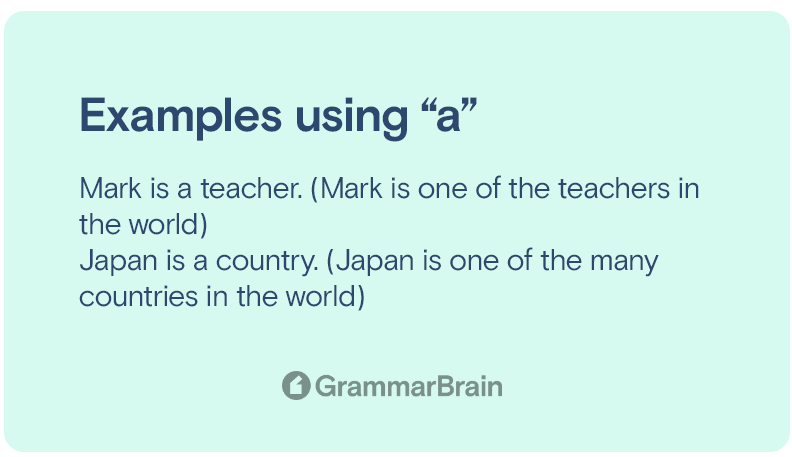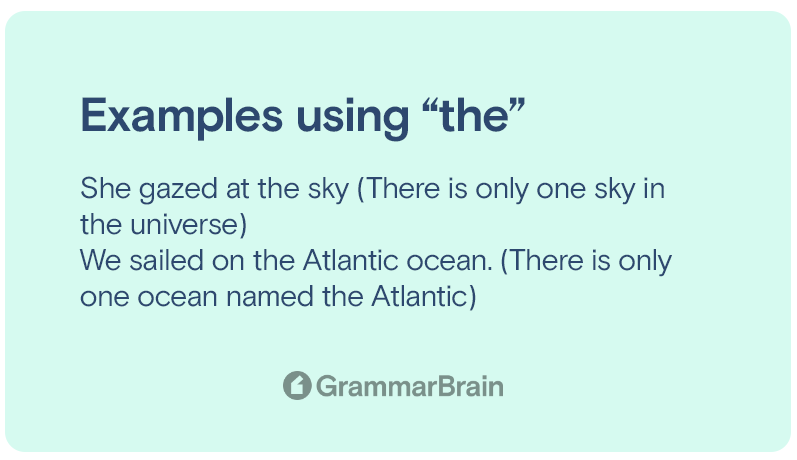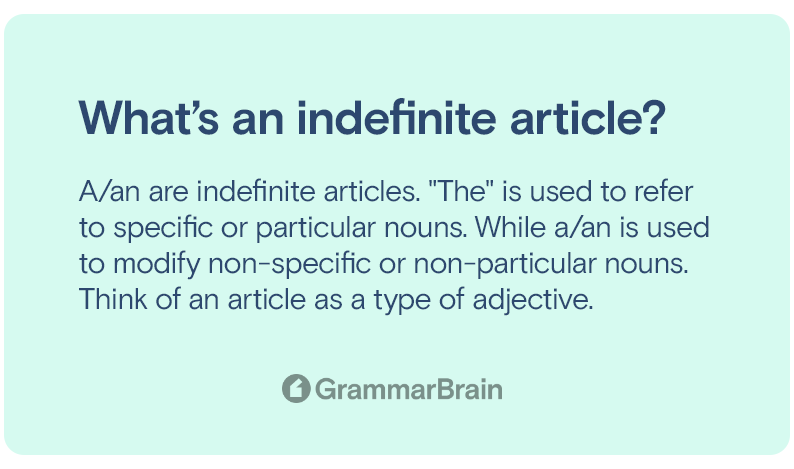What’s the difference between a and the? An article is a word used to specify a noun is a noun without describing it. There are two types of articles. They are definite and indefinite articles. The definite article is “the,” and the indefinite articles are “a” and “an.”
Let us discuss the difference between “a” and “the.”
“A/an” indefinite articles and “the” definite articles?
A/an are indefinite articles. “The” is used to refer to specific or particular nouns. While a/an is used to modify non-specific or non-particular nouns. Think of an article as a type of adjective. “The” is a definite article.
Using “a”
“a” is an indefinite article that refers to things that are not unique and non-specific. It also refers to something as a concept or idea. It is used before consonants or consonant sounds.

Example sentences of “a”
- Mark is a teacher. (Mark is one of the teachers in the world)
- Japan is a country. (Japan is one of the many countries in the world)
- I am looking for a toy. (Not looking for a specific doll)
- Please give me a pen. (Can give me an available pen)
- Going trekking is a fun experience. (The act of “going trekking” is something described as a “fun experience”)
- Pinky has a cat. (Pinky owns a cat but does not know anything about it)
- A boy is waiting outside. (Do not know who the boy is)
Using “the”
“The” is a definite article used to refer to unique things and groups. It is used if both the listener and speaker know the identity. The writer or speaker uses the article “the” first to introduce a thing they are talking about.

Example sentences of “the”
- She gazed at the sky (There is only one sky in the universe)
- We sailed on the Atlantic ocean. (There is only one ocean named the Atlantic)
- Jane went to the school (Both the listener and speaker know which school Jane went to)
- The women are going outside. (Both the listener and speaker know the identity of the women)
- We saw kids playing in the park. The kids were enjoying themselves. (The word “the” means that the kids in the second sentence are the same kids mentioned in the first sentence.)
Difference between “a” and “the”
- “a”-Specific identity not known to the listener and speaker.
“the” Specific identity is known to the listener and speaker.
- “a” -It follows unknown singular nouns starting with consonant sounds.
“the” – It follows both singular and plural nouns.
- “a” – It can be used only with count nouns.
“the”- It can be used with noncount nouns.
- “a” – It is used only before consonant sounds.
“the” – It can be used before both vowels and consonants.
Examples of comparison
The speaker is asking whether they have been to any mountain, not about any specific mountain.
- Have you been to the mountain?
The listener and speaker know the mountain which is referred to. It makes the noun specific.
- Would you like a banana?
Not specific
- Would you like to try the banana smoothie?
Specific
- Do you have a dog?
Not specific
- Have you seen the dog?
Specific
Similarities between “a” and “the”
Some common types of nouns don’t take either “a” or “the”
- Languages- She speaks Russian. I studied French and Spanish.
- Names of academic subjects – I love maths. She is terrible at Physics.
- Names of sports – I like to play volleyball. We watched football on TV.
- Abstract nouns- The professor gave a lecture on Politics.
- Names of persons – Mary is living with John.
Inside this article
Fact checked:
Content is rigorously reviewed by a team of qualified and experienced fact checkers. Fact checkers review articles for factual accuracy, relevance, and timeliness. Learn more.
Core lessons
Glossary
- Abstract Noun
- Accusative Case
- Anecdote
- Antonym
- Active Sentence
- Adverb
- Adjective
- Allegory
- Alliteration
- Adjective Clause
- Adjective Phrase
- Ampersand
- Anastrophe
- Adverbial Clause
- Appositive Phrase
- Clause
- Compound Adjective
- Complex Sentence
- Compound Words
- Compound Predicate
- Common Noun
- Comparative Adjective
- Comparative and Superlative
- Compound Noun
- Compound Subject
- Compound Sentence
- Copular Verb
- Collective Noun
- Colloquialism
- Conciseness
- Consonance
- Conditional
- Concrete Noun
- Conjunction
- Conjugation
- Conditional Sentence
- Comma Splice
- Correlative Conjunction
- Coordinating Conjunction
- Coordinate Adjective
- Cumulative Adjective
- Dative Case
- Determiner
- Declarative Sentence
- Declarative Statement
- Direct Object Pronoun
- Direct Object
- Diction
- Diphthong
- Dangling Modifier
- Demonstrative Pronoun
- Demonstrative Adjective
- Direct Characterization
- Definite Article
- Doublespeak
- False Dilemma Fallacy
- Future Perfect Progressive
- Future Simple
- Future Perfect Continuous
- Future Perfect
- First Conditional
- Irregular Adjective
- Irregular Verb
- Imperative Sentence
- Indefinite Article
- Intransitive Verb
- Introductory Phrase
- Indefinite Pronoun
- Indirect Characterization
- Interrogative Sentence
- Intensive Pronoun
- Inanimate Object
- Indefinite Tense
- Infinitive Phrase
- Interjection
- Intensifier
- Infinitive
- Indicative Mood
- Participle
- Parallelism
- Prepositional Phrase
- Past Simple Tense
- Past Continuous Tense
- Past Perfect Tense
- Past Progressive Tense
- Present Simple Tense
- Present Perfect Tense
- Personal Pronoun
- Personification
- Persuasive Writing
- Parallel Structure
- Phrasal Verb
- Predicate Adjective
- Predicate Nominative
- Phonetic Language
- Plural Noun
- Punctuation
- Punctuation Marks
- Preposition
- Preposition of Place
- Parts of Speech
- Possessive Adjective
- Possessive Determiner
- Possessive Case
- Possessive Noun
- Proper Adjective
- Proper Noun
- Present Participle
- Prefix
- Predicate




